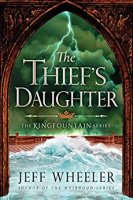A lot has changed in 35 years, and not all for the better.
Looking through some old journal entries, I read about a time when our five-year-old daughter spiked a fever at night.
She ran a fever last night. I don't know how high, but she was delirious [her not-uncommon response to fevers]. If it weren't so serious, it would be entertaining, listening to her describe the things she sees. Normally I would wait a few days to see what would happen, but things are so busy that I took her to the doctor, since if she were going to need an antibiotic, I wanted it started right away. But: "It's a virus, $32 please."
She can go back to school tomorrow. "Why not?" they said. "That's where she got it in the first place."
Can you imagine that scenario taking place today? Yet that's the way life was, and I think those were saner times.
Permalink | Read 953 times | Comments (0)
Category Education: [first] [previous] [next] [newest] Health: [first] [previous] [next] [newest] Politics: [first] [previous] [next] [newest] Children & Family Issues: [first] [previous] [next] [newest]
I liked Bed, Bath and Beyond. The prices were usually a little higher than elsewhere, but there was always a good coupon available that more than made up for it. Hands down my favorite part of their service was the warranty policy that gave me a brand-new toaster oven every time mine wore out, which happened at least twice over the years. There was no nonsense of a one- or two-year warranty, or even five. If it failed, they cheerfullly handed over a brand-new replacement. You can bet I preferred to buy my small appliances there, even though I never actually had occasion to replace any but the toaster ovens.
All that to say, I'm really sorry to see Bed, Bath and Beyond go.
You wouldn't believe from the size of my stack of BB&B coupons that I actually have thrown many away. But the local stores always honored them even if they were many years past their printed expiration date, so it seemed prudent to have a good stack on hand.
Now I guess I can finally recycle them all—a small bright spot in the gloom.
Permalink | Read 880 times | Comments (0)
Category Everyday Life: [first] [previous] [next] [newest]
In times of crisis, traditional rules of procedural fairness can be modified.
So said Gerard Kennedy, Canadian law professor and politician, on the freezing of protesters' bank accounts. (You can read his testimony here.)
The best and truest rejoinder to that I've heard came, I think, from David Freiheit (also a Canadian lawyer):
In times of crisis, traditional rules of fairness need to be fortified, not modified.
The 20th anniversary DarkHorse Podcast is full of apparently random interesting topics. If you have the time for the whole hour and 40 minute show, you can skip to about minute 11:30 to get past the ads. There is discussion of sea star wasting disease, then a very long section on telomeres and how both the New York Times (no surprise) and the New England Journal of Medicine (more concerning) recently managed to ignore critical information that was known 20 years ago.
I enjoyed those parts, but if you just start at 1:13:00 you'll get 26 minutes of really good stuff, I think. From finding truth in the words of people with whom you have serious disagreements, to the complex problem of moving forward without losing the good of what you've left behind, to why dishwashers that use less water might poison the environment by forcing the use of more and stronger detergents.
My favorite part, however, and the part I think some of our family members will appreciate, is the discussion of Elimination Communication at about 1:28:10, and the idea of the new mother's "babymoon" period just before that. (They don't use either of those terms, however.) Not that our famly will find anything new there—and it's been known for years among the homeschool/home birth/breastfeeding/raw milk/organic food/homesteading/etc. crowd. What's so interesting to me is that it shows up in this podcast, totally unexpectedly. In their naïveté about the subject, Bret and Heather get some things wrong (as their listeners were quick to point out) but they get a lot right, too, and at least they are aware of it, which most people are not.
Permalink | Read 1246 times | Comments (0)
Category Health: [first] [previous] [next] [newest] Children & Family Issues: [first] [previous] [next] [newest] Random Musings: [first] [previous] [next] [newest] Everyday Life: [first] [previous] [next] [newest] Conservationist Living: [first] [previous] [next] [newest]
Over the years, Porter has ordered all sorts of movies from Netflix (the old-fashioned, DVD-in-the-mail way), and every once in a while one will catch my attention, too. I wasn't planning to watch Bridge of Spies, but I wandered into the room at the wrong time, and was soon hooked. Probably because it's based on true events, maybe because it stars Tom Hanks. Anyway, it's a worthwhile movie. Here's one of the trailers (under two minutes).
What has stayed with me clearest and longest from the movie is a single quote. Actually, it's one quote but used multiple times. You can see three in this 2.5-minute video.
"Would it help?" We find ourselves asking each other that question a lot these days, when we all have so many things to worry about. It makes us smile, and maybe let go of a little anxiety.


 The Queen's Poisoner by Jeff Wheeler (47North, 2016)
The Queen's Poisoner by Jeff Wheeler (47North, 2016)
The Thief's Daughter by Jeff Wheeler (47North, 2016)
The King's Traitor by Jeff Wheeler (47North, 2016)
Jeff Wheeler is a prolific author with enough books to keep me going for a very long time. Due to the length of my current reading list, it will be a while before I get to any of his other fantasy worlds—unless our grandchildren start reading them. But these three were a delight. I'm very grateful to the friend who recommended Jeff Wheeler to me. Here's what she wrote about his books:
As for Fantasy, Jeff Wheeler is at the top of my search list. Though I am long past the age of the readers his books are aimed at, I thoroughly enjoy the worlds he has created, borrowing liberally from the Arthurian Legend, Shakespeare, and the Bible! Sometimes his allusions are obvious; others, I have a belated OMG moment when I realize a certain character is actually a well-known figure from our own legends of the past. I should add that through thick and thin Wheeler emphasizes the honorable behavior of his young protagonists, including chastity.
You certainly don't need to catch all his allusions (or even any of them) to enjoy the books, but they are delightful, like finding hidden Mickeys at Disney World, or Easter eggs in a computer game.
The Queen's Poisoner, the first in the Kingfountain series, was a true joy to read, probably because the protagonist is young. The second, The Thief's Daughter, was not so hard to put down because the character has grown enough to make romance—one of my least favorite genres—a significant element, but there was enough action to get me through it. Plus, the romantic element has an interesting twist. And in the final book, The King's Traitor, you get all three: interesting children, romance with surprises (but not too much), and satisfying action.
All in a world where good is good, evil is evil, and both degradation and redemption are real.
Oh, Facebook, when am I going to totally give up on you?
It's the people who keep me going there, albeit in a much-reduced state. People for whom Facebook is the best way to keep in touch. They're worth it.
Then again, maybe I stay there for the amusement, too.
First, Facebook took down my 9/11 tribute post on the grounds that my image of Osama bin Laden violated their community standards. Now, I've done it again.
They didn't actually remove my comment (at least not yet), but they did give me this warning:
(I made the comment to the post of a friend, a very knowledgeable gun-collector, in which he expressed his annoyance at TV shows and movies that "portray firearms with unlimited capacity and no reloads.")
So tell me, Facebook—where in my comment is anything resembling "hate speech"? Do you think it's hateful to call Americans ignorant? Or to imply that Hollywood takes liberties with the truth?
That was my ironic laugh for the day. Good night all. Sweet dreams.
Permalink | Read 1075 times | Comments (0)
Category Just for Fun: [first] [previous] [next] [newest] Social Media: [first] [previous] [next] [newest]
It was a beautiful launch last night, just after sunset. I only recorded a small part, first because I wanted to enjoy it unhindered, and second because the flight path made it appear to turn downward, thus taking it behind the trees. Porter, using a monocular, could see the engine array instead of just a bright light.
We miss far more launches than I document. When we remember, we set an alarm, because it's too easy to be distracted, even if we're home to step out the front door and watch. The great news is that these days we don't have to wait several months for another chance!
Permalink | Read 828 times | Comments (0)
Category Everyday Life: [first] [previous] [next] [newest]
It's been a while since I've shared a favorite YouTube channel, and this one comes with a warning: It will make you hungry!
The channel is Pro Home Cooks, founded by Mike Greenfield. I've been salivating over it for some time, but the video that directly inspired this post is This Fried Chicken Recipe Took Over NYC (9,000 Waitlist) (16 minutes).
You can easily find lots of good cooking videos on the channel, so to round out this post I'm choosing a couple that show a little more about the life behind the shows. The first is a 17-minute "day in the life" video.
Finally, this is a very short (one-minute) video in a different format, but it gives a view of his very enviable garden.
I hope you enjoy Pro Home Cooks as much as I do.
"Go play outside!"
So said generations of mothers—at least once we got past the eons of history in which both work and play generally took place outdoors by default.
Partly, that motherly admonition was meant to get us out from underfoot, but there was also a high respect for the value of "fresh air and sunshine" for health and growth.
No one had to tell me twice to get outdoors, not when there were trees to climb and a forest to explore. I've been an avid bookworm ever since I learned to read, but I was happy to do much of my reading on the platform my father had built for us high in the trees.
When did the outdoors become our enemy?
Being exposed to the sun was branded a high-risk activity for children, unless they were slathered in sunscreen—not just at the beach, but in their own backyards. Even then, playing outside was not encouraged, for it provided no relief for mothers, who were told they had to keep their eyes on their children at all times, lest they get hurt, or even kidnapped. How much easier and safer it was to keep them indoors, entertained by the magic of that handy babysitter, the television set—the gateway drug of today's "screens."
However, the tide may be turning, at least a bit. Parents are once again at least thinking about trying to get their kids outdoor time. They are struggling to believe with their hearts the statistics that show kidnapping by strangers and mass shootings to be minuscule risks in most of the United States, and the discovery that children need a bit of danger and challenge to grow up both physically and mentally healthy. More and more people are realizing that the advice we were given for avoiding COVID—stay indoors, and especially avoid playgrounds, beaches, and neighborhood walks—was likely the exact opposite of what we should have been doing. Ever so slowly we are recognizing that our mothers, grandmothers, and great-grandmothers may have been right when they told us to go out and play. Fresh air and sunshine are indeed our friends.
Here's another reason why:
It is dark inside your head, but even there, the sun does shine.
This is the beginning of Heather Heying's latest substack post about the great value of Near Infrared Radiation (NIR), those wavelengths of light just longer than red.
Most people have heard of the hormone melatonin, known for its regulation of the sleep-wake cycle. This is created by the pineal gland, and is called circulating melatonin.
But there is also subcellular melatonin, which, it turns out, is produced in the mitochondria of our cells, stimulated by exposure to NIR.
Subcellular melatonin is a powerful antioxidant. ... Oxidation is a ubiquitous and destructive process in organisms, a natural side-effect of metabolism. Antioxidants scavenge the free radicals formed by oxidation, thus mitigating its deleterious effects. Melatonin is a particularly strong and multi-functional antioxidant.
In the brain, melatonin’s antioxidant capacity is likely to be especially important, both because of the disproportionately high use of oxygen by the brain, and because some other antioxidant systems are not present there. Absent near infrared photons being carried deep into the brain, which then promote the synthesis of subcellular melatonin, brain function might go more than a bit haywire.
Subcellular melatonin also reduces inflammation, increases the rates of waste removal within cells, and has immunoregulatory effects. Furthermore, it improves mitochondrial function via several known mechanisms, and generally promotes health and vitality. And again, there is substantial evidence that NIR prompts its formation.
So how do we get this NIR to our mitochondria? Here's the good news:
- The majority of photons that reach us from the sun are actually in the NIR range.
- Unlike visible and ultraviolet light, NIR penetrates deep into our bodies, including our brains.
- The bodies of babies and young children are perfused with NIR.
- Cerebrospinal fluid distributes NIR photons deep into the brain.
- NIR comes to us not only from the sun, but also reflected off objects around us, such as the moon, leaves, snow, sand—they can reach us standing in the shade, fully dressed.
- Just after sunrise and before sunset are particularly good times to pick up NIR.
- NIR is also produced by campfires, candlelight, and incandescent bulbs.
The bad news?
- Because our bodies are thicker, the average adult gets less than 2/3 the NIR penetration children do. Just what we need—another good reason to lose weight.
- Most of the lighting that we modern people experience indoors (fluorescent, LED) does not provide this vital nutrient.
You can read Dr. Heying's entire article, with a lot more, and references, here.
For those who prefer a non-print source, here's an excerpt from the latest DarkHorse Podcast episode (#170) in which she introduces the subject. (approximately minutes 25:34 to 39:32)
As most of you know, David Freiheit (Viva Frei) has been my favorite Canadian lawyer since sometime in 2020. Even though he no longer practices law and subsequently fled Canada for Florida, for the sake of his kids. I haven't posted anything from him in a while, because, frankly, his explosion of fame following his livestream coverage of the Canadian truckers' Freedom Convoy has meant that I can't possibly keep up with him.
However, we recently made time for his 1.5-hour interview with Dr. Bret Weinstein, and except for the first three minutes, every second was worthwhile. We were even happy to listen to it at normal speed (which we have to do when watching it on television instead of on the computer) because the information content is dense.
Since most of you will find the time commitment untenable, please at least take ten minutes and listen to minutes 21 through 31, and Bret's story about the incredible discovery he made in his grad school research about cancer, longevity, and the laboratory mice used in drug safety testing. If that whets your appetite for the rest of the interview, so much the better.
Bret is an excellent speaker: clear, cogent, and riveting. Viva and the other host, Robert Barnes, are normally quite interactive with their guests, sometimes to the point where I wish they would shut up and let the guest continue speaking. Not this time. As one commenter put it, "Watching Barnes and Frei blink for 10 minutes or more at a time with their lips closed is so unnatural...." Bret is that interesting.
I've been watching Bret's DarkHorse Podcasts for quite a while now, and I still learned a lot here. Skip the first three minutes—after that it's gold.
One advantage to having aligned myself with the more "high church" denominations is that the major holidays. Twelve days of Christmas and 50 days of Easter! Therefore I get to post this Babylon Bee Easter skit. The background is this passage from the 28th chapter of the Gospel of Matthew, describing the situation a few days after Jesus was crucified and buried in a rock tomb.
Now after the Sabbath, toward the dawn of the first day of the week, Mary Magdalene and the other Mary went to see the tomb. And behold, there was a great earthquake, for an angel of the Lord descended from heaven and came and rolled back the stone and sat on it. His appearance was like lightning, and his clothing white as snow. And for fear of him the guards trembled and became like dead men. But the angel said to the women, “Do not be afraid, for I know that you seek Jesus who was crucified. He is not here, for he has risen, as he said. Come, see the place where he lay. Then go quickly and tell his disciples that he has risen from the dead....”
While they were going, behold, some of the guard went into the city and told the chief priests all that had taken place. And when they had assembled with the elders and taken counsel, they gave a sufficient sum of money to the soldiers and said, “Tell people, ‘His disciples came by night and stole him away while we were asleep.’ And if this comes to the governor's ears, we will satisfy him and keep you out of trouble.” So they took the money and did as they were directed.
It must have been a goodly sum of money to get the guards to confess to having fallen asleep on duty. I'm sure the penalties for that were severe—not to mention the shame. And the story about Jesus' disciples stealing his body and pretending that he had risen from the dead could easily have had credibility in the early days. But given what they later went through because of their insistence on the truth of Jesus' resurrection, I don't see how it could have held up. (five-minute video)
Sure, people throughout history have given themselves over to torture and death for things they believed to be true and important, even if they were wrong. But how long could you maintain that attitude about a lie that you knew to be a lie because you orchestrated it yourself?
Permalink | Read 1068 times | Comments (0)
Category Random Musings: [first] [previous] [next] [newest] Just for Fun: [first] [previous] [next] [newest]
Those of you who are better than I am at remembering political names will understand Porter's oft-repeated saying from the very end of the last century:
In the 2000 election, I was afraid our hopes would be Daschled and our aspirations Gored, but instead we were am-Bushed.
Thinking about President George W. Bush, I am reminded of President Jimmy Carter of the opposite party: great person, terrible president. High ideals do not an effective statesman make. Neither are they sufficient to impart the wisdom needed to lead a country through crisis. There's a Darkness in our politics that delights in taking down naïve idealism, and it doesn't much care what political affiliation it uses.
Nonetheless, I'll take the hopeful, honest call to courage of Bush's first inaugural address—superbly crafted by speechwriter Michael Gerson and delivered on January 20, 2001—over the bitter, divisive anger that is stock-in-trade today, when more than ever our differences run so deep, it seems we share a continent, but not a country.
President Clinton, distinguished guests and my fellow citizens:
The peaceful transfer of authority is rare in history, yet common in our country. With a simple oath, we affirm old traditions and make new beginnings.
As I begin, I thank President Clinton for his service to our nation; and I thank Vice President Gore for a contest conducted with spirit and ended with grace.
I am honored and humbled to stand here, where so many of America's leaders have come before me, and so many will follow.
We have a place, all of us, in a long story. A story we continue, but whose end we will not see. It is the story of a new world that became a friend and liberator of the old, a story of a slave-holding society that became a servant of freedom, the story of a power that went into the world to protect but not possess, to defend but not to conquer. It is the American story. A story of flawed and fallible people, united across the generations by grand and enduring ideals. The grandest of these ideals is an unfolding American promise that everyone belongs, that everyone deserves a chance, that no insignificant person was ever born. Americans are called upon to enact this promise in our lives and in our laws; and though our nation has sometimes halted, and sometimes delayed, we must follow no other course.
Through much of the last century, America's faith in freedom and democracy was a rock in a raging sea. Now it is a seed upon the wind, taking root in many nations. Our democratic faith is more than the creed of our country, it is the inborn hope of our humanity, an ideal we carry but do not own, a trust we bear and pass along; and even after nearly 225 years, we have a long way yet to travel.
While many of our citizens prosper, others doubt the promise, even the justice, of our own country. The ambitions of some Americans are limited by failing schools and hidden prejudice and the circumstances of their birth; and sometimes our differences run so deep, it seems we share a continent, but not a country. We do not accept this, and we will not allow it. Our unity, our union, is the serious work of leaders and citizens in every generation; and this is my solemn pledge, "I will work to build a single nation of justice and opportunity." I know this is in our reach because we are guided by a power larger than ourselves who creates us equal in His image and we are confident in principles that unite and lead us onward.
America has never been united by blood or birth or soil. We are bound by ideals that move us beyond our backgrounds, lift us above our interests and teach us what it means to be citizens. Every child must be taught these principles. Every citizen must uphold them; and every immigrant, by embracing these ideals, makes our country more, not less, American.
Today, we affirm a new commitment to live out our nation's promise through civility, courage, compassion and character. America, at its best, matches a commitment to principle with a concern for civility. A civil society demands from each of us good will and respect, fair dealing and forgiveness. Some seem to believe that our politics can afford to be petty because, in a time of peace, the stakes of our debates appear small. But the stakes for America are never small. If our country does not lead the cause of freedom, it will not be led. If we do not turn the hearts of children toward knowledge and character, we will lose their gifts and undermine their idealism. If we permit our economy to drift and decline, the vulnerable will suffer most. We must live up to the calling we share. Civility is not a tactic or a sentiment. It is the determined choice of trust over cynicism, of community over chaos. This commitment, if we keep it, is a way to shared accomplishment.
America, at its best, is also courageous. Our national courage has been clear in times of depression and war, when defending common dangers defined our common good. Now we must choose if the example of our fathers and mothers will inspire us or condemn us. We must show courage in a time of blessing by confronting problems instead of passing them on to future generations.
Together, we will reclaim America's schools, before ignorance and apathy claim more young lives; we will reform Social Security and Medicare, sparing our children from struggles we have the power to prevent; we will reduce taxes, to recover the momentum of our economy and reward the effort and enterprise of working Americans; we will build our defenses beyond challenge, lest weakness invite challenge; and we will confront weapons of mass destruction, so that a new century is spared new horrors.
The enemies of liberty and our country should make no mistake, America remains engaged in the world by history and by choice, shaping a balance of power that favors freedom. We will defend our allies and our interests; we will show purpose without arrogance; we will meet aggression and bad faith with resolve and strength; and to all nations, we will speak for the values that gave our nation birth.
America, at its best, is compassionate. In the quiet of American conscience, we know that deep, persistent poverty is unworthy of our nation's promise. Whatever our views of its cause, we can agree that children at risk are not at fault. Abandonment and abuse are not acts of God, they are failures of love. The proliferation of prisons, however necessary, is no substitute for hope and order in our souls. Where there is suffering, there is duty. Americans in need are not strangers, they are citizens, not problems, but priorities, and all of us are diminished when any are hopeless. Government has great responsibilities for public safety and public health, for civil rights and common schools. Yet compassion is the work of a nation, not just a government. Some needs and hurts are so deep they will only respond to a mentor's touch or a pastor's prayer. Church and charity, synagogue and mosque lend our communities their humanity, and they will have an honored place in our plans and in our laws. Many in our country do not know the pain of poverty, but we can listen to those who do. I can pledge our nation to a goal, "When we see that wounded traveler on the road to Jericho, we will not pass to the other side."
America, at its best, is a place where personal responsibility is valued and expected. Encouraging responsibility is not a search for scapegoats, it is a call to conscience. Though it requires sacrifice, it brings a deeper fulfillment. We find the fullness of life not only in options, but in commitments. We find that children and community are the commitments that set us free. Our public interest depends on private character, on civic duty and family bonds and basic fairness, on uncounted, unhonored acts of decency which give direction to our freedom. Sometimes in life we are called to do great things. But as a saint of our times has said, every day we are called to do small things with great love. The most important tasks of a democracy are done by everyone. I will live and lead by these principles, "to advance my convictions with civility, to pursue the public interest with courage, to speak for greater justice and compassion, to call for responsibility and try to live it as well." In all of these ways, I will bring the values of our history to the care of our times.
What you do is as important as anything government does. I ask you to seek a common good beyond your comfort; to defend needed reforms against easy attacks; to serve your nation, beginning with your neighbor. I ask you to be citizens. Citizens, not spectators; citizens, not subjects; responsible citizens, building communities of service and a nation of character.
Americans are generous and strong and decent, not because we believe in ourselves, but because we hold beliefs beyond ourselves. When this spirit of citizenship is missing, no government program can replace it. When this spirit is present, no wrong can stand against it.
After the Declaration of Independence was signed, Virginia statesman John Page wrote to Thomas Jefferson, "We know the race is not to the swift nor the battle to the strong. Do you not think an angel rides in the whirlwind and directs this storm?" Much time has passed since Jefferson arrived for his inauguration. The years and changes accumulate, but the themes of this day he would know, "our nation's grand story of courage and its simple dream of dignity."
We are not this story's author, who fills time and eternity with His purpose. Yet His purpose is achieved in our duty, and our duty is fulfilled in service to one another. Never tiring, never yielding, never finishing, we renew that purpose today; to make our country more just and generous; to affirm the dignity of our lives and every life.
This work continues. This story goes on. And an angel still rides in the whirlwind and directs this storm.
God bless you all, and God bless America.
It begins early, the idea that there is only one right answer to a problem.
Here's part of a journal entry from when one of our children was in first grade:
She brought home several papers of the kind in which she had to identify beginning and ending sounds. The focus of one was a set of images, for which she was supposed to indicate whether the "p" sound came at the beginning or the end.
Next to the picture of a policeman, she had indicated that the "p" was at the end, and the the teacher had corrected it to the beginning, without further comment.
You can probably guess what comes next.
I asked our daughter what the picture was, and she replied, "cop."
What if I had not been there to assure her that her answer was perfectly correct, and to explain why the teacher thought it was wrong?
Permalink | Read 1105 times | Comments (1)
Category Education: [first] [previous] [next] [newest] Politics: [first] [previous] [next] [newest] Children & Family Issues: [first] [previous] [next] [newest] Random Musings: [first] [previous] [next] [newest]
That will be our opening hymn this morning, and it's one of my favorites.
Happy Easter to all!





